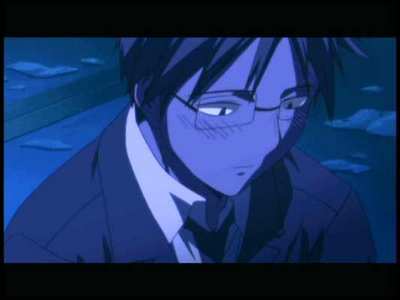Review of She, The Ultimate Weapon Vol.2
Introduction
The second volume of She, The Ultimate Weapon a.k.a. Saikano is upon us, and with it a change in the release format. In the US, the thirteen episodes of Saikano were released over four volumes, but Manga have opted for a three volume release in the UK, upping the episode counts and easing the burden on the wallet somewhat. It also has meant that the featurette on this disc doesn`t exactly tie in to the episodes, so if you wish to avoid spoilers, it may be worth waiting until you have seen all the episodes first.
Saikano is a prime example at what anime excels at, taking a premise that seems absurd at first glance, and treating it with compelling emotional honesty. The story seems implausible at first glance, yet it still manages to fashion a drama that is gripping and heartfelt. Saikano is a simple high school love story. Two teenagers fall in love, and have to overcome many obstacles to win through. To make life difficult, their romance takes place against a background of a devastating war. To make life nigh on impossible, she has been engineered by the military into the Ultimate Weapon, and when called upon undergoes a complete transformation into an avenging angel. It`s the age-old story of boy meets girl, girl turns into weapon, girl has existential crisis about being a killing machine, boy can`t deal. You see it all the time.
Saikano`s story is told over 13 episodes, with episodes 5-8 presented here on a two disc set, replete with Manga`s usual plethora of soundtrack options.
Ep 5. Liar
Chise`s abilities continue to increase as she becomes stronger. But her actions threaten her conscience, and it`s only her feelings for Shuji that keep her grounded. Then, at school she senses an impending earthquake, and her instinctive reaction to that reveals another side to her personality. This developing sense also proves problematic, as Shuji has been feeling guilty about his association with Ms Fuyumi, and Chise begins to sense his guilt. Meanwhile, Shuji`s friend Atsushi decides to enlist in order to protect the girl he loves.
Ep 6. Classmates
The war is moving closer and closer to home, with images of the destruction of mainland Japan on the news. Shuji confesses all to Chise, and as a result Chise wants things back the way they were before they started going out, just classmates. But life is never that simple, and going back isn`t an option.
Ep 7. What I Want To Protect
Shuji`s feelings for Chise are more complicated than ever, with his growing affection tempered by a very real fear, as Chise becomes an increasingly ruthless killer, evidenced when an enemy plane is destroyed on the outskirts of town. They plan one more date, but Chise leaves school before they get a chance. Meanwhile Atsushi is assigned to his new unit, where he meets a jaded Lt. Tetsu.
Ep 8. Everyone`s Changing
Winter comes, and the school is getting emptier as students find reasons not to come any more. The war is getting closer, and there is an enemy pilot hiding out in the woods near the town. Meanwhile Chise is assigned to protect another city, but is having a hard time with her feelings for Shuji and her growing destructive abilities. Lt Tetsu offers her the chance to be a little girl for a day, and takes her on a shopping spree through the deserted city.

Video
Continuing on from the previous volume, we get a somewhat disappointing 1.85:1 letterbox image. Once you get used to the lower resolution, the transfer comes across as clear and sharp, with strong colours. The perennial problem of digital banding is apparent, but the animation exhibits the usual Gonzo splendour, with distinctive characters, and effective action sequences.

Audio
Whereas the US release had only DD 2.0 Stereo tracks, Manga go their usual route of adding DD 5.1 and DTS upmixes, in both English and Japanese. Once again this necessitates the show being repeated on two discs, with the DTS mixes confined with a DD 2.0 Stereo English track to disc 2.
As usual, I opted for the DD 5.1 Japanese track, and found that it made punchy use of the surrounds, with the soundstage being put to efficient use for the effects and action sequences. In an improvement over my experience with the first volume, the sound is balanced well, and the dialogue is clear and audible throughout. I sampled the English dub, and found it to be acceptable but not quite up to the standards set by the original actors. Saikano has another good music soundtrack though, and I wasn`t once tempted to skip through the credit sequences. Subtitles are zoom friendly of course.

Features
Both discs get the usual animated menus and disc 1 contains the usual gallery of Manga Entertainment trailers. You can watch the episodes individually, or use the Play All option.
Disc 2 contains 15 pages of production art, as well as a 12-minute interview with Shinichiro Miki (Tetsu) and Miki Ito (Fuyumi), where they chat about the show and their characters. With the altered release format, and the fact that the interview was bought directly from the Japanese company, there is an understandable disclaimer that you may find some of the material lacks pertinence to the volume, and also contains a couple of spoilers.

Conclusion
The coin was in the air for me with Volume 1 of Saikano, but watching the second volume has been a far more satisfying experience, with the story developing well, and the characters fleshed out so that it is easier to relate to them. This volume also makes clear that Saikano is an all or nothing experience, you either like it or you don`t, and watching one volume in isolation will be less than satisfying. I`m looking forward to the third and final volume so that I can watch the series in one sitting.
Saikano is a love story, `The last love story on this little planet` as the series subtitle would have it, but it is differentiated from other anime by the emotional honesty with which the story is infused. Where other shows would attempt to inject comedy, farce and miscommunication to make things interesting, here the relationships are more straightforward, there is little prevarication and the story gets straight to the point. There is still the unrequited love aspect of other relationships, people getting the wrong end of the stick, or ignoring that which is right under their noses, but this remains in the background. What is more important is exploring the characters` feelings and this anime accomplishes that with a depth and sensitivity that is quite unique in my experience with anime. Still, this is teen romance, and there is that level of immaturity and exaggeration that implies. This is the age when kids are going through changes, falling in love is the biggest thing in the word, and where the slightest setback feels like the end of that world. How better to extend that metaphor by setting the story during a devastating conflict, how else to indicate that age of changes than by making one of your protagonists a WMD in that conflict?
That it also renders an anti-war message doesn`t hurt either. Saikano actually benefits by having the two stories intertwined. The war contrasts strongly with the love story, and neither aspect overpowers the other. Instead they lend strength to each other, the love story seems more desperate because of the conflict, while the war seems more personal and immediate for the relationships being built or torn apart because of it. Contrasting it with rare moments of silliness also helps the tragic nature of the story. It`s the sort of moment that you see in lighter anime, where comedic interludes are telegraphed by giving the characters deformed cute looks. These moments are jarring and seem out of place in Saikano, but actually work to make the bleaker moments of the story seem twice as dark.
In this volume there is plenty of bleakness. We ended volume 1 with Chise unable to come to terms with her destructive abilities. This volume sees that change in many ways. Her relationship with Shuji is unconventional to begin with, and as her abilities grow, Shuji`s fear of her intensifies. It`s understandable, but his fear does end up hurting her to the point that it drives a wedge between them. Chise`s response is to devote herself to her missions, to actively seek combat and action, to replace her feelings for Shuji. There is also a part of her that begins to revel in the violence. We get to see other relationships affected by the war. Atsushi joins the army because of his unrequited feelings for Akemi, and finds that he is in over his head. After the events of the previous volume, Lt Tetsu has shut himself off from his comrades, perceiving them all as dead men walking. The only person who reawakens his humanity is Chise, simply because she is an all-powerful weapon who is impervious to death.
The war also progresses badly, Japan`s forces are on the back foot, and are even willing to negotiate, rationing and shortages of essentials begins to bite, and even the army`s perception of Chise has changed. Part of it is because her abilities have grown even more destructive, and unlike before where she was considered a champion, now soldiers regard her as an angel of death, presaging total destruction wherever she appears.
Saikano, or She, The Ultimate Weapon is probably not to all tastes. I must admit that it isn`t quite what I look for in an anime, yet I have come to appreciate its emotional depth and multifaceted story. At the heart of it are some strong, and realistic characterisations that go beyond what you often get in the medium. Also despite the subject matter, it`s never cloying or saccharine, and rather than being buffeted by an anti-war polemic, the message is thoughtful, considered and always in context of the story. Saikano is shaping up to be an excellent anime that offers something original. I`m steeling myself for an unhappy ending though, as I can`t see champagne and wedding bells at the end of this one.
Your Opinions and Comments
Be the first to post a comment!